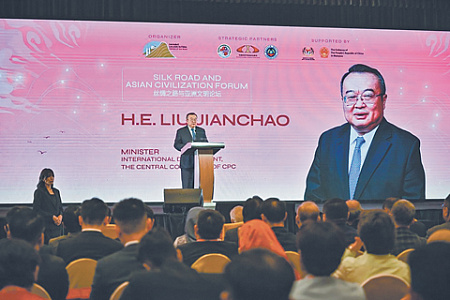
A cloud of uncertainty hanging over a senior member of the Chinese Communist Party’s Central Committee has partially lifted, only to reveal a deeper political mystery. Liu Jianchao, the influential head of the party’s International Department, which manages relations with foreign political parties, has been effectively removed from his post after disappearing from public view for two months. His role has been filled by Liu Haixing, formerly the director of the Foreign Ministry’s Europe department, with Beijing offering no official explanation for the sudden reshuffle, fueling speculation of another high-level purge.
The information vacuum surrounding Liu Jianchao began in late July after he returned from an overseas trip and abruptly ceased all media activity. Once considered a rising star and a potential candidate for foreign minister, his sudden vanishing act led commentators to a familiar conclusion in the opaque world of Chinese elite politics: he has likely been detained, possibly under investigation for corruption, a fate that has befallen many powerful officials before him.
Liu Jianchao’s profile made him a significant figure on the international stage. Appointed in January 2022, he frequently engaged with prominent foreign leaders. With a background that includes studying at Oxford University, fluency in English, and a posting at the Chinese embassy in London, he was a key interlocutor for the West. Ironically, his resume also includes a stint at the Central Commission for Discipline Inspection, the party’s top anti-graft watchdog. His downfall suggests he may have become a target of the very anti-corruption campaign, initiated by President Xi Jinping in 2012, that he once helped to enforce.
However, this incident does not exist in isolation and echoes the even more dramatic disappearance of former Foreign Minister Qin Gang in 2023. Qin was abruptly removed from his post, and the state-controlled media has maintained a strict silence on his fate ever since. Unconfirmed reports in Western media suggested his downfall was linked to an extramarital affair with a journalist while he was ambassador to the United States. The narrative took a turn towards international espionage with claims, attributed to Russian intelligence sources, that his mistress was an agent for Britain’s MI6, prompting his immediate removal.
Yet, an investigation in today’s China does not always spell the end of a political career. The case of Sun Haiyan, a deputy head at the same International Department, serves as a counterpoint. She was reportedly detained for questioning in August but later reappeared at public functions, suggesting that the allegations against her were dismissed. This indicates that the system allows for reversals and that not every investigation leads to a conviction, challenging the narrative of an unforgiving and absolute political machine.
Consequently, the circumstances surrounding Liu Jianchao’s removal may be more complex than a simple corruption charge. Like the Qin Gang affair, which some analysts suspect could have been fueled by disinformation from political rivals, Liu’s case underscores the profound opacity of Beijing’s decision-making. While his fall from grace signals internal turmoil, it is premature to interpret this personnel change as a definitive shift in China’s foreign policy. For now, it remains another chapter in the ongoing saga of vanishing elites, leaving the world to guess at the power plays unfolding behind the closed doors of Zhongnanhai.
